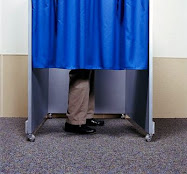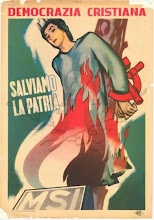martedì 28 ottobre 2008
Blog & Election
"It's official. This US Election matters to me more than it should," Perez wrote shortly after the first presidential debate. His two-year-old blog, Ako Mismo, or "I, Myself" in Tagalog, is written mostly in English, with some Tagalog mixed in. In a phone interview, the 25-year-old says following the White House race has been "like a religion."
The Web is flat, especially when it comes to this marathon campaign. Every twist and turn, every new character, not only unfolds stateside in real time, endlessly commented on by the blogosphere, but also keeps the rest of the world on its collective mouse, with bloggers from countries as disparate as the Philippines, South Africa and Brazil glued to the historic race.
Differing time zones aren't considered barriers on the Web, where different languages can be easily translated on Google. Sure, many foreigners have paid attention to America's presidential elections through newspapers and television in the past. But the continued mainstreaming of the Internet, online experts say, has given non-Americans access to more information than ever before -- and, through blogging, an interactive platform to express their views. David Sifry, founder of the search engine Technorati, says: "As the tools have gotten simpler and easier to use, there's been an absolute explosion in the number of bloggers outside of the U.S., and one of the subjects they blog about is politics."
And right now, American politics.
Just visit Voices Without Votes, an aggregator of the international blogosphere. An offshoot of the nonprofit site Global Voices, which aims to summarize the goings-on in every blogging corner of the World Wide Web, the site focuses solely on the U.S. presidential race.
Voices Without Votes was born in early February -- yep, in time for Super Tuesday -- and it's edited by Amira Al Hussaini, a 35-year-old journalist from Bahrain who currently lives in Canada. The site's motto reads: "America votes. The world speaks." Recent elections in Zimbabwe and New Zealand have attracted some attention online, Al Hussaini says, but not nearly to the extent that the battle for the American presidency has.
"The Internet makes the world smaller, just a few clicks away, right?" says Al Hussaini, who was the former news editor at the Gulf Daily News, the largest English newspaper in Bahrain. With Voices, she says, "Americans can see, if they don't realize it already, that their votes affect the rest of us when it comes to foreign policy, the environment, the global market, you name it."
The site is not an online hit, garnering fewer than 100,000 pages views since its launch. But what Voices lacks in traffic, it makes up for in the scope of its content. There's nothing else quite like it.
Voices is funded by Reuters, whose server hosts the site, though Mark Jones, Reuters's global community editor, says the news service doesn't control what's on it. That falls to Al Hussaini, the site's only paid staffer. She manages an eclectic group of about 20 volunteers, all in their 20s and 30s, who speak English but are also fluent in other languages.
Scattered throughout the world, they scour the Internet, reading blogs and searching for mentions of the upcoming election. From February to August, 300 to 400 blog entries were featured on the site. It grew to 800 in September and about 1,100 this month.
There's no single directory of international blogs, Al Hussaini says, and she and her staff specialize in specific regions. They make sure that no one region is overrepresented on the site. It's a labor-intensive process. Though many sign their names in their blogs, just as many do not. Each volunteer has to read the blog, contact the blogger and locate where he or she is. "A lot of people write blogs without telling you where they're from," explains Al Hussaini, who speaks Arabic and monitors a list of about 1,000 blogs in the Middle East. Most bloggers write in English. Some, however, need translating.
Paula Góes, one of the volunteers, grew up in Bahia, in the northeastern part of Brazil. She moved to London six years ago and works as a translator. Brazil is a country of mixed races, says the 32-year-old, and many Brazilians are closely watching Sen. Barack Obama -- so much so that, as Góes wrote in a blog for Voices, six candidates in the country's local elections added "Obama" to their names. None of the Obama wannabes won. "The Portuguese blogs have been all over this election," Góes says in an interview. Even Tina Fey's impersonation of Gov. Sarah Palin has been dissected.
When Sen. John McCain visited Iraq in April, Iraqi bloggers chimed in. "I'll bet you anything, that the Americans will vote for McCain," a blogger named Layla Anwar predicted. Like many Americans, foreigners reacted with surprise at McCain's choice of Palin as his running mate. Some heralded the pick. Others didn't. A blogger in Kuwait, citing both Palin and Sen. Hillary Clinton, wrote on a site called Teach the Masses, "All in all this is a good lesson for the girls in our schools -- they have seen through Hillary Clinton and now Sarah Palin what a woman with an education can do." But a blogger in France, after watching Palin's speech at the Republican National Convention, wrote of the vice presidential nominee: "She is someone who believes in creationism and who thinks that global warming is a hoax! In the most scientifically advanced nation in the world, this is beyond shocking."
Al Hussaini says Voices tries to feature postings on McCain and Obama equally. She points to a Pakistani blogger who thought McCain won the first presidential debate, which was intended to focus on foreign policy. Still, there's no contest when it comes to online global popularity. Echoing the results of recent Gallup polls conducted in 70 countries showing overwhelming support for the Democratic nominee, most international bloggingheads are fascinated by Obama. On a site called If the World Could Vote, created by a 23-year-old Obama supporter in Iceland, about 475,000 people from 200 countries have cast their ballots. As of yesterday, Obama trumps McCain, 87 percent to 13 percent.
Perez, the high school teacher in Manila, can rattle off every state that Obama won in the primaries. Even his margins of victories. And state polls that now show him in the lead. "I've been too busy paying attention to this American election," Perez says, "that I don't really know what's going on here in the Philippines."
The Web is flat, especially when it comes to this marathon campaign. Every twist and turn, every new character, not only unfolds stateside in real time, endlessly commented on by the blogosphere, but also keeps the rest of the world on its collective mouse, with bloggers from countries as disparate as the Philippines, South Africa and Brazil glued to the historic race.
Differing time zones aren't considered barriers on the Web, where different languages can be easily translated on Google. Sure, many foreigners have paid attention to America's presidential elections through newspapers and television in the past. But the continued mainstreaming of the Internet, online experts say, has given non-Americans access to more information than ever before -- and, through blogging, an interactive platform to express their views. David Sifry, founder of the search engine Technorati, says: "As the tools have gotten simpler and easier to use, there's been an absolute explosion in the number of bloggers outside of the U.S., and one of the subjects they blog about is politics."
And right now, American politics.
Just visit Voices Without Votes, an aggregator of the international blogosphere. An offshoot of the nonprofit site Global Voices, which aims to summarize the goings-on in every blogging corner of the World Wide Web, the site focuses solely on the U.S. presidential race.
Voices Without Votes was born in early February -- yep, in time for Super Tuesday -- and it's edited by Amira Al Hussaini, a 35-year-old journalist from Bahrain who currently lives in Canada. The site's motto reads: "America votes. The world speaks." Recent elections in Zimbabwe and New Zealand have attracted some attention online, Al Hussaini says, but not nearly to the extent that the battle for the American presidency has.
"The Internet makes the world smaller, just a few clicks away, right?" says Al Hussaini, who was the former news editor at the Gulf Daily News, the largest English newspaper in Bahrain. With Voices, she says, "Americans can see, if they don't realize it already, that their votes affect the rest of us when it comes to foreign policy, the environment, the global market, you name it."
The site is not an online hit, garnering fewer than 100,000 pages views since its launch. But what Voices lacks in traffic, it makes up for in the scope of its content. There's nothing else quite like it.
Voices is funded by Reuters, whose server hosts the site, though Mark Jones, Reuters's global community editor, says the news service doesn't control what's on it. That falls to Al Hussaini, the site's only paid staffer. She manages an eclectic group of about 20 volunteers, all in their 20s and 30s, who speak English but are also fluent in other languages.
Scattered throughout the world, they scour the Internet, reading blogs and searching for mentions of the upcoming election. From February to August, 300 to 400 blog entries were featured on the site. It grew to 800 in September and about 1,100 this month.
There's no single directory of international blogs, Al Hussaini says, and she and her staff specialize in specific regions. They make sure that no one region is overrepresented on the site. It's a labor-intensive process. Though many sign their names in their blogs, just as many do not. Each volunteer has to read the blog, contact the blogger and locate where he or she is. "A lot of people write blogs without telling you where they're from," explains Al Hussaini, who speaks Arabic and monitors a list of about 1,000 blogs in the Middle East. Most bloggers write in English. Some, however, need translating.
Paula Góes, one of the volunteers, grew up in Bahia, in the northeastern part of Brazil. She moved to London six years ago and works as a translator. Brazil is a country of mixed races, says the 32-year-old, and many Brazilians are closely watching Sen. Barack Obama -- so much so that, as Góes wrote in a blog for Voices, six candidates in the country's local elections added "Obama" to their names. None of the Obama wannabes won. "The Portuguese blogs have been all over this election," Góes says in an interview. Even Tina Fey's impersonation of Gov. Sarah Palin has been dissected.
When Sen. John McCain visited Iraq in April, Iraqi bloggers chimed in. "I'll bet you anything, that the Americans will vote for McCain," a blogger named Layla Anwar predicted. Like many Americans, foreigners reacted with surprise at McCain's choice of Palin as his running mate. Some heralded the pick. Others didn't. A blogger in Kuwait, citing both Palin and Sen. Hillary Clinton, wrote on a site called Teach the Masses, "All in all this is a good lesson for the girls in our schools -- they have seen through Hillary Clinton and now Sarah Palin what a woman with an education can do." But a blogger in France, after watching Palin's speech at the Republican National Convention, wrote of the vice presidential nominee: "She is someone who believes in creationism and who thinks that global warming is a hoax! In the most scientifically advanced nation in the world, this is beyond shocking."
Al Hussaini says Voices tries to feature postings on McCain and Obama equally. She points to a Pakistani blogger who thought McCain won the first presidential debate, which was intended to focus on foreign policy. Still, there's no contest when it comes to online global popularity. Echoing the results of recent Gallup polls conducted in 70 countries showing overwhelming support for the Democratic nominee, most international bloggingheads are fascinated by Obama. On a site called If the World Could Vote, created by a 23-year-old Obama supporter in Iceland, about 475,000 people from 200 countries have cast their ballots. As of yesterday, Obama trumps McCain, 87 percent to 13 percent.
Perez, the high school teacher in Manila, can rattle off every state that Obama won in the primaries. Even his margins of victories. And state polls that now show him in the lead. "I've been too busy paying attention to this American election," Perez says, "that I don't really know what's going on here in the Philippines."



















